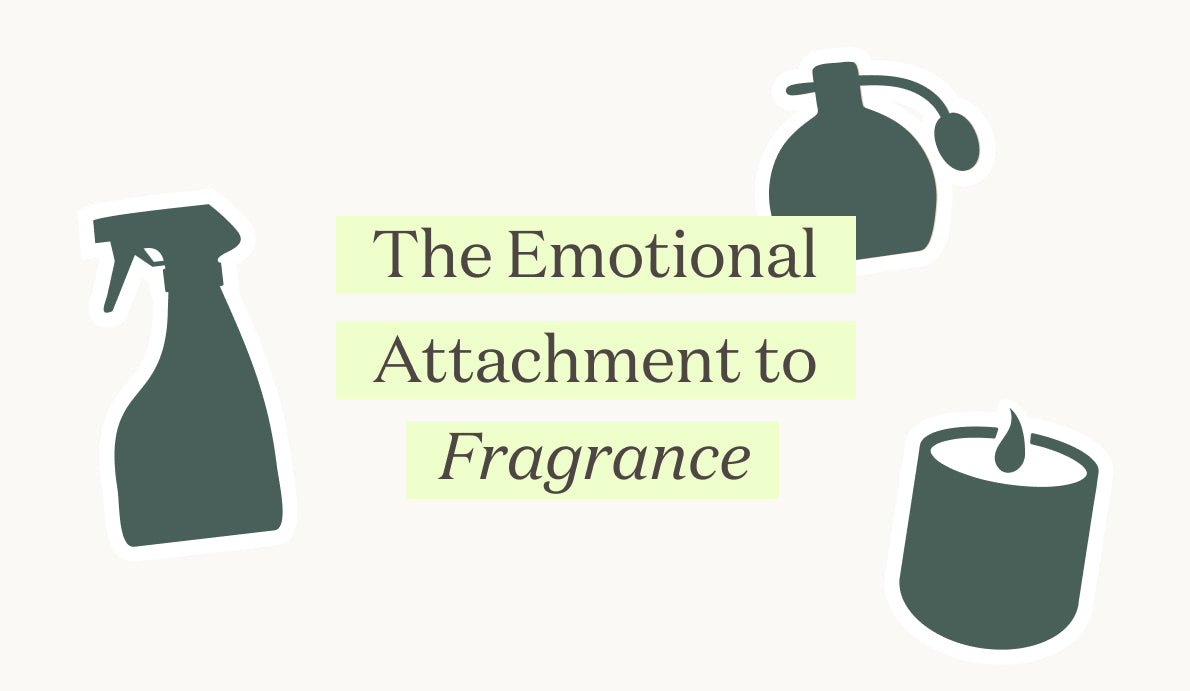The Emotional Attachment To Fragrance

When we ask our customers their favorite thing about Branch Basics, we get an overwhelming response of “fragrance-free!”
However, when we talk to others about making the switch to human-safe products, many tell us their worries and aversion around the idea of going fragrance-free. They like their laundry to smell like that “clean linen” scent, or their countertops to have a scent of basil or lemon.
We want you to understand the truth about synthetic fragrances and set you free from their harmful effects!
It can be a tough habit to break as it may involve rewiring of the brain, breaking from a physical dependence, a shift in perspective, or a redefinition of what we think of as “clean”.
Why We Feel Attached To Scents & Fragrances
Synthetic fragrance has been incorporated into most products we grew up with and now use in our homes today. Synthetic chemicals used to make up fragrance recipes have narcotic-like properties that are linked to physical and emotional dependency which triggers repeated use.
We associate a certain scent or smell with the task or emotion as it has been ingrained through repetition; we think when our home smells of pine, it smells clean.
Our sense of smell is directly linked to the brain. When we inhale something, the scent goes directly to our limbic system, which is the part of our brain involved in our behavioral responses, emotional responses and memory. This is why scents bring back strong emotions and can even trigger a change of mood response.
As a society, we’ve become accustomed to most of our products having a synthetic fragrance.
We also never want our homes or ourselves to smell bad. Yes, a scented candle or plug-in air freshener can mask the smell of dog or musk that we’re looking to cover up! But this is just a temporary solution to a more significant problem, and it is undermining your health.
How Fragrance Harms Your Health
The immediate and long-term effects of synthetic fragrance exposure is hazardous to human health.
“Fragrance” on an ingredient list can actually represent a recipe made up of hundreds of synthetic chemicals.
These chemicals are selected from a reservoir of 5,000 ingredients, a large number of which haven’t been tested for safety.

If you haven’t already, we encourage you to take time to dig into what synthetic fragrance really is and why we’re so passionate about removing it from our lives in our Wellness Center: Fragrance Is The New Secondhand Smoke, How To Remove Synthetic Fragrance From Your Home, Stop Using The F Word.
Have you ever been stuck on a plane next to someone with a high dose of cologne or perfume, and felt nauseous? That’s a warning from your body and brain, an immediate reaction to inhaling a toxic synthetic fragrance!
Those who are super sensitive may have immediate serious adverse effects upon exposure, but even those generally not sensitive may experience headaches, asthma, sneezing, nausea and dizziness related to the synthetic fragrance.
It is essential to understand that synthetic fragrance chemicals impact us all as they are asthmagens (cause asthma), carcinogens (cause cancer), neurotoxins (affect the brain), obesogens (make us gain weight), and endocrine disruptors (impact our hormones).
Adapting To A Fragrance-Free Lifestyle
The moral of the story: synthetic fragrances are toxic and we should strive to be fragrance-free. We understand this can be a super difficult switch as many of us are attached to the synthetic fragrances we love!
As with any detoxing, change and adaptation takes time, effort, and being a bit uncomfortable. Giving fragrance-free products a chance, and allowing your body to spend time adjusting to it, is important.
Remember, when you make the switch to fragrance-free, you're doing right by your own body, those you surround yourself with, and the earth.
Navigating A Fragrant World

We are social creatures who move around constantly. We are put into environments that are not our own; our neighbors' houses, our friends’ cars, gyms, restaurants, department stores, and much more.
Sometimes, there is just no way to control if you are in the presence of synthetic fragrance. When that is the case, the best thing you can do is get outside as often as possible.
Ask if you can sit on a patio at a restaurant or on the porch of someone's house, or ask an office if you can wait outside versus in the waiting room.
Most importantly, limit your exposure as much as you can!
Talking To Others About Synthetic Fragrance
It can be challenging to talk to others about fragrance. However, talking to your family and friends about removing fragrance can be beneficial and open their eyes to a new way of thinking and feeling!
You are offering a gift of liberation - tossing this toxin changes people’s lives. Plus, you never know how someone will respond until you try, right?
Tips For Talking To Others About Fragrance-Free
- Approach the conversation with a positive mindset versus a negative. For example, you could start with, “My asthma is gone, and I feel so much clearer now that I removed synthetic fragrances in my home!” versus, “Synthetic fragrance is toxic and can lead to diabetes, obesity, cancer, hormone disruption…” You don’t want to scare or overwhelm others.
- Explain your own sensitivity to synthetic fragrance and what happened when you removed it. The personalization of your story is important, it brings warmth and personal insight into the conversation!
- Overall, don’t use offensive remarks and try your best not to come off as “above” it. Unfortunately, living a certain lifestyle can come off this way, but it’s really just about making the healthiest choices you can! See our article Making Healthy Choices When Others Aren't Aligned for more on this.
- Acknowledge that changing habits and giving up products is hard, and requires some time to adjust and get used to a new way of life.
- Offer to help them get started and talk about small first steps they could take! This could include switching to natural candles, removing toxic air fresheners from their home, or ditching their dryer sheets.
If you feel confident taking it a step further, you could even talk to your workplace about adopting a Fragrance-Free Workplace Policy! These are becoming more and more common in order to create an environment that is safe and healthy for all.
Living By Example
No matter how the conversation goes, remember that good habits can be contagious and live by example! When others see you living a healthy and prosperous life, they will want that as well.
There will always be situations and environments you cannot control, and in the end, you can only control yourself and your own home.
Your friends and family will have to put in the effort to make these lifestyle changes, but there is nothing wrong with a little guidance if they are willing to listen! It’s through honest, tough, but meaningful conversations that positive changes arise.
Also: to have a healthy, fragrance-free home, it's important to use human-safe cleaning practices.
Check out Branch Basic's Premium Starter Kit to begin ditching the toxins in your home, and read about the cleaning tools you can use to create a happy, healthy household.
For more on synthetic fragrance, check out:
Categories

Marilee Nelson
Marilee Nelson is an Environmental Toxins expert who has spent nearly 30 years advocating for the chemically-sensitive and chronically-ill. She is a Board Certified Nutritionist, Certified Bau-Biologist and Bau-Biology Inspector and specializes in Food As Medicine. She has helped thousands of families and individuals identify, heal and recover from toxic exposures and is on a mission to revolutionize the way American families view their health.








